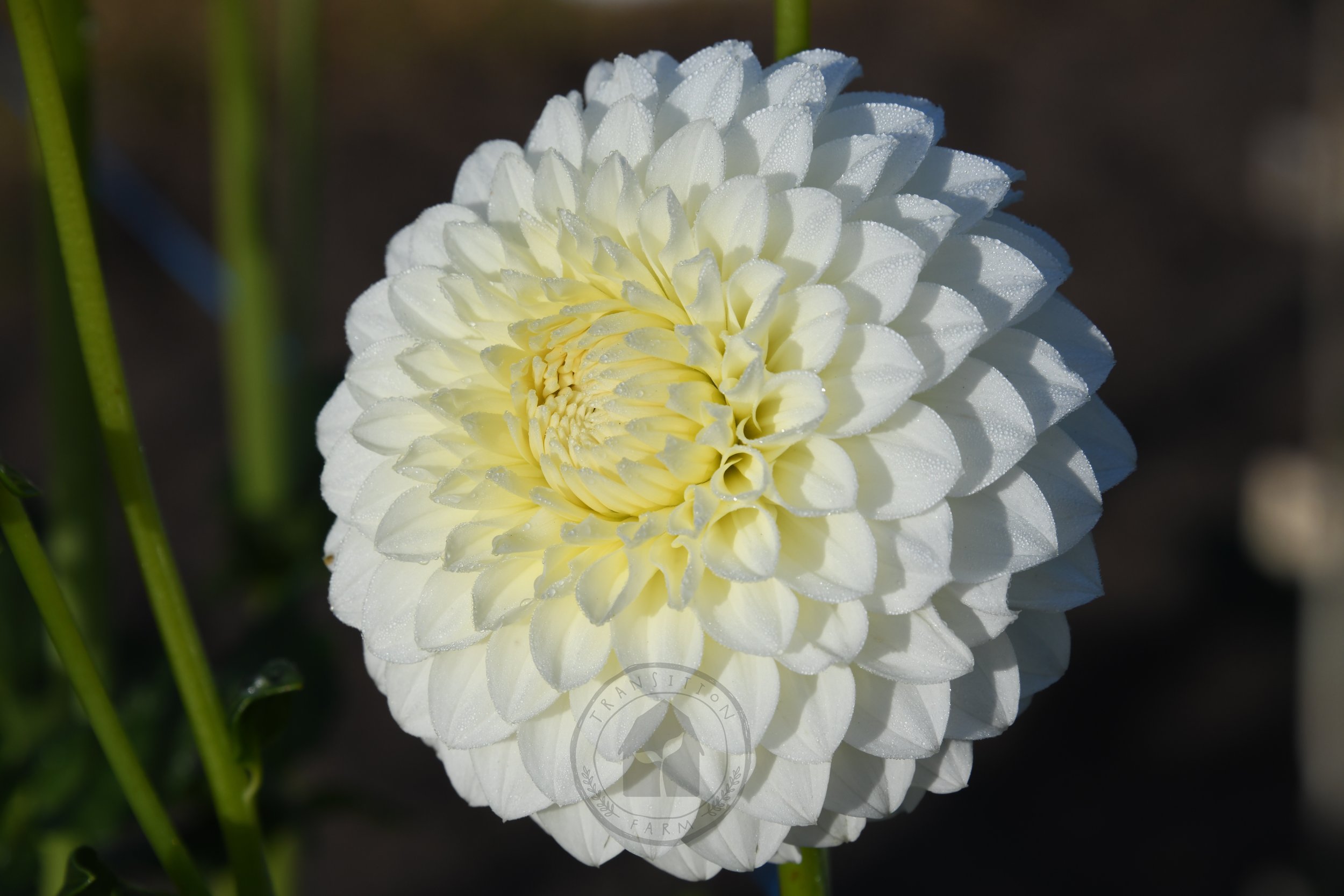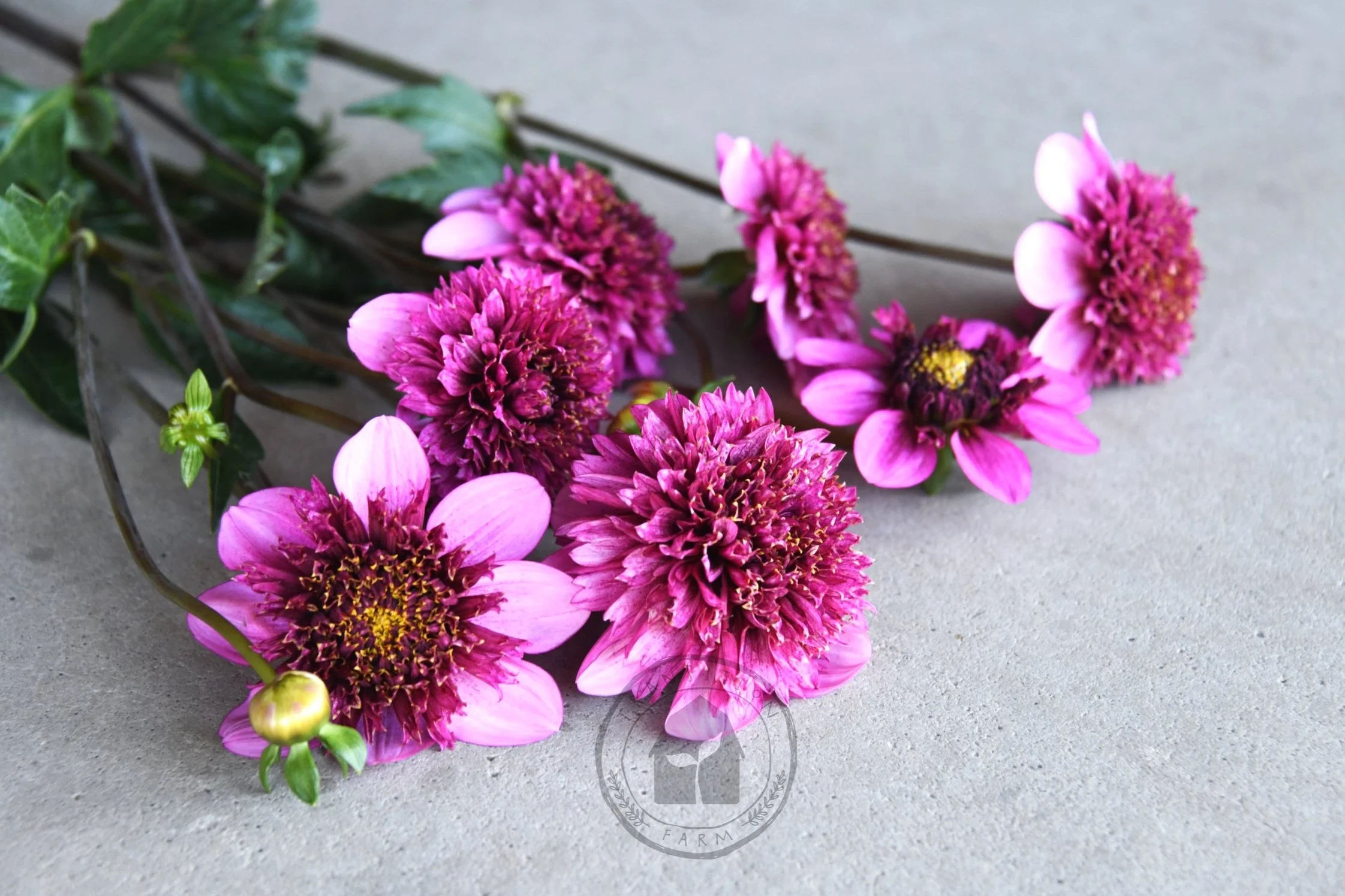TRANSITION FARM ORGANIC SEED
Quality 100% Certified Organic and Demeter Bio-dynamic NON-GMO Seed
Dahlia tubers will be lifted in May and stored through winter.
We hope to be able to offer pre-sales in August for shipping in September.
Orange Pom
Orange Pom
Dahlia pinnata
Sweet, prolific, soft apricot to pale burnt orange, these terra cotta almost pompon blooms on tall stems make these great accompany flowers for arrangements and design work. The colour complements a wide range from violet to reds to neon pink.
Bloom Size - 45mm
Bloom Type - Miniature Decorative
Bloom Time - Mid Season
Prolific Bloomer. Great for dahlia bunches. While classed as a miniature decorative dahlia, it is very close to being a pom.
For more detailed information about BLOOM TYPE, please read this
Certified Organic and Certified Demeter Bio-Dynamic
1 tuber
Tuber Planting, Growing and Harvest Information
| Plant Type | Site | Spacing | Height | Bloom Size | Bloom Form | Bloom Time |
|---|---|---|---|---|---|---|
| Tender Annual |
Full Sun | 30cm apart | 75cm | 45-50mm | Miniature Decorative | Mid Season |
PLANTING AND GROWING
Dahlia’s are cold sensitive. Wait to plant your tubers until the ground is at least 15°C and all danger of frost has past.
Dahlias’s require full sun - at least 6 hours a day. They also benefit from late afternoon shading in areas with intense summer heat.
Choose a position with free draining, ph neutral soil. We treat our dahlia’s like tomatoes, preparing the soil in the Autumn before with well rotted manure, rock phosphate and/or bone meal depending on the soil needs. We then sow a diverse green manure mix of oats, peas, lupin, vetch, clover, rye. We leave this to grow late autumn - early spring, mowing it down and incorporating it into the soil 3-4 weeks ahead of planting our dahlia tubers.
To plant, dig a hole 10-15cm deep and place the tuber on its side horizontally with the growing eye facing up. Cover with soil. Some dahlias are quite large plants. We allow 30cm between plants.
Wait to water until you see the shoot. Overwatering before you see the shoot can lead to tuber rot. We have found dahlias respond well to consistent water throughout the growing season. We use soaker hoses to achieve this. These are best laid out at planting.
When the shoot is about 20-30cm high, hard pinch the centre by cutting out about 10cm just above a leaf node. You should be able to see the branches forming. This encourages branching which increases flower production and stem length.
Protect shoots from snails and slug.
STAKING - We have found early staking protects young plants from spring wind. On the farm, we corral dahlias. We use 2.5m metal posts (pounded into the ground about 40cm) every 2.5m, a row either side of the plants. We string heavy bailing twine between each post- a new string at 20- 30cm intervals. We then just ensure that the plants are tucked into the twine on either side. Home gardeners can secure plants to a single stake or use a metal cage system.
HARVEST AND VASE LIFE
Dahlia blooms do not keep opening after harvest. Ensure that blooms are near fully open AND check that the petals on the back side of the flower are still fresh. If they are brown, wilted and/or falling off, your vase life will be effected as the bloom is already old.
Dahlia’s are considered “event” flowers. Expect a vase life of 5-7 days with flowers cut in the coolest part of the day and placed immediately into cold water. We have great vase life results with the following three recommendations:
1) Ensure plants have been watered at least 12 hours prior to cutting.
2) Harvest in the cool part of the day and instantly hydrate the flowers.
3) Transfer to a cool shed or room.
Change the water in your container daily and/or use commercial floral preservative to keep bacteria at bay. Miniature Ball and Ball bloom types may have a longer vase life.
Flowers that will be travel benefit from one or several of the following recommendations: Transferring into buckets with 25%-50% floral preservative; Sear stem ends by placing into 70-80°C (just off boiling) water and allow to sit in water and cool for one hour; Chill for at least 8 hours at 3-4°C.
NOTE - For more detailed information about BLOOM TYPE, please read this.
STORING DAHLIA TUBERS
To dig or not to dig - It is a question for those in mild winter areas (winters that rarely fall below 5°C) and one we cannot answer for you. If your winter is wet, lifting your tubers protects them from rot. Talk to other dahlia growers in your area.
We offer the following guidelines for winter storage of dahlia tubers.
Store your tubers in a rodent proof area or rodent proof boxes. Mice and Rats can destroy your entire collection quickly!
Store in a space that maintains a temperature around 5-10C°, away from direct light.
Store tubers in saw dust, pine shavings or vermiculite to protect from moisture - It is a balancing act. You want your tubers to remain plump and not dry and shrivel. AND you want to protect your tubers from cold and rot. If this is all new, we suggest not just putting them in a dark corner and hoping for the best. Check on them throughout winter and see if your storage method and place of storage is working
Store in a space with adequate airflow to ensure condensation is not forming.





















